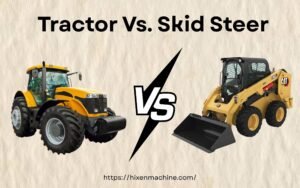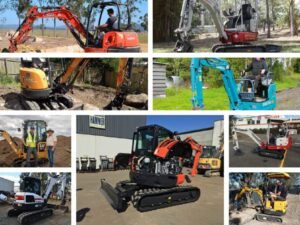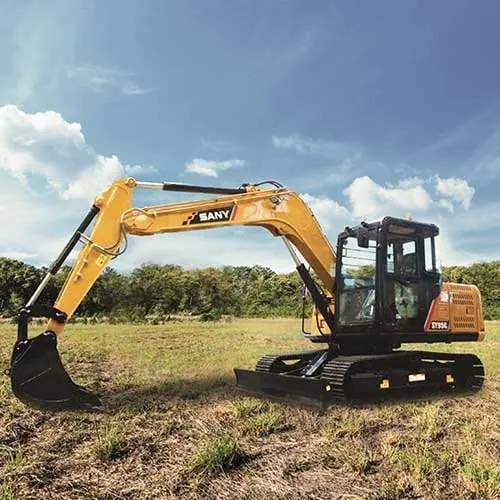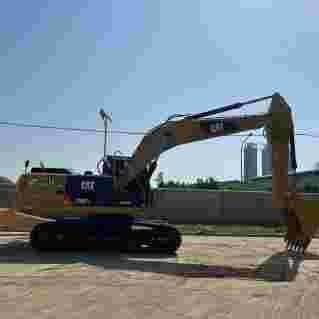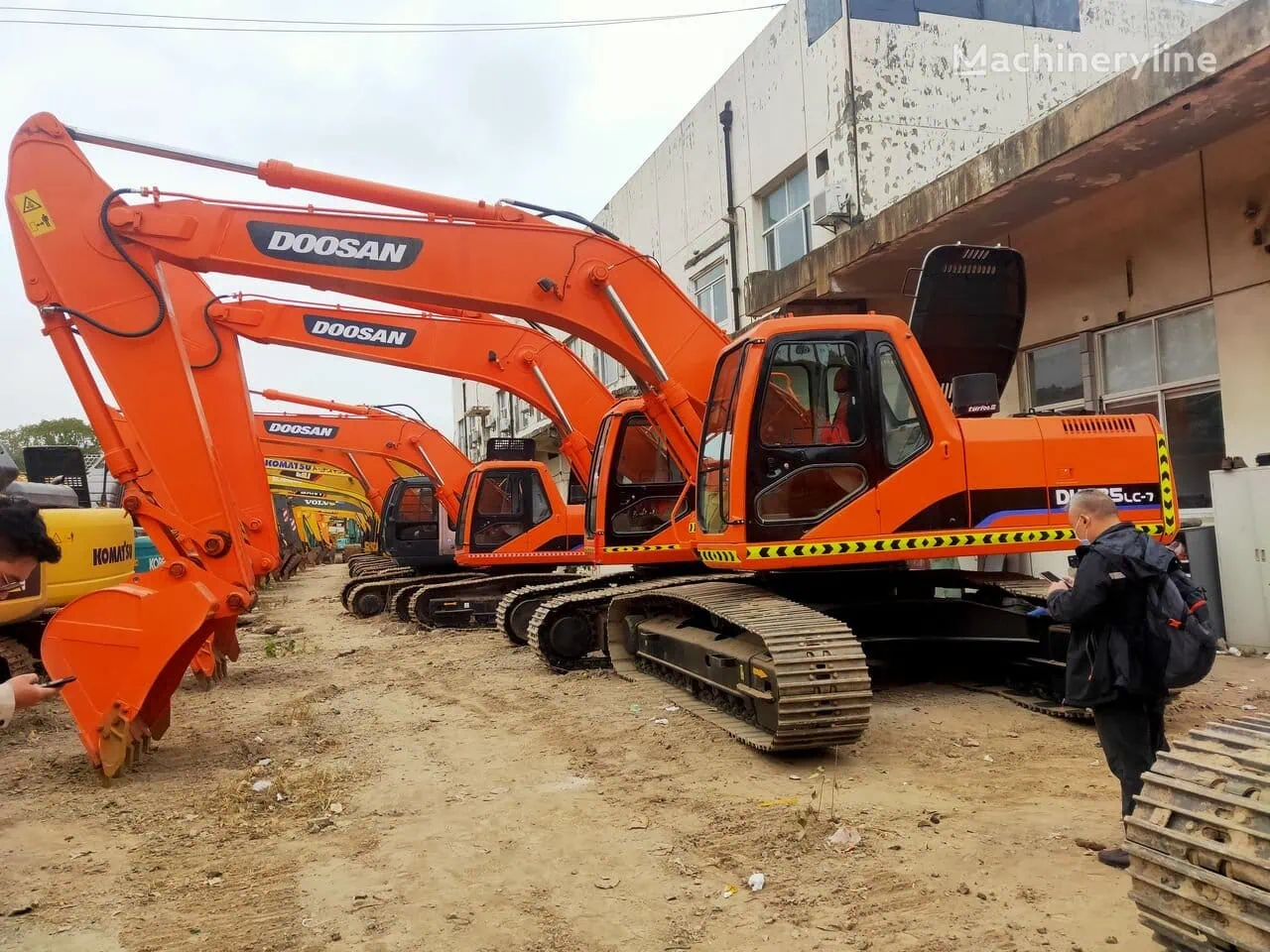Any work—whether it’s digging holes or whatever else— requires a backhoe or a mini excavator. You don’t know what the hell you need to get, and you hope you get the right one. If you get the wrong one, you are going to be screwed, you are going to be delayed, it is going to cost you extra money, or you are going to get nothing done. You need to know what you need to order when you are buying the machine to do your job right.
When deciding between a backhoe vs mini excavator for small construction projects, it’s essential to understand their differences. Backhoes offer versatility, capable of both digging and loading materials, while mini excavators excel in tight spaces with their precise digging ability. Each machine has its unique advantages, and understanding these can help you choose the best option for your specific needs.
Considering a deep dive into the strengths of each machine can help you make the best decision.
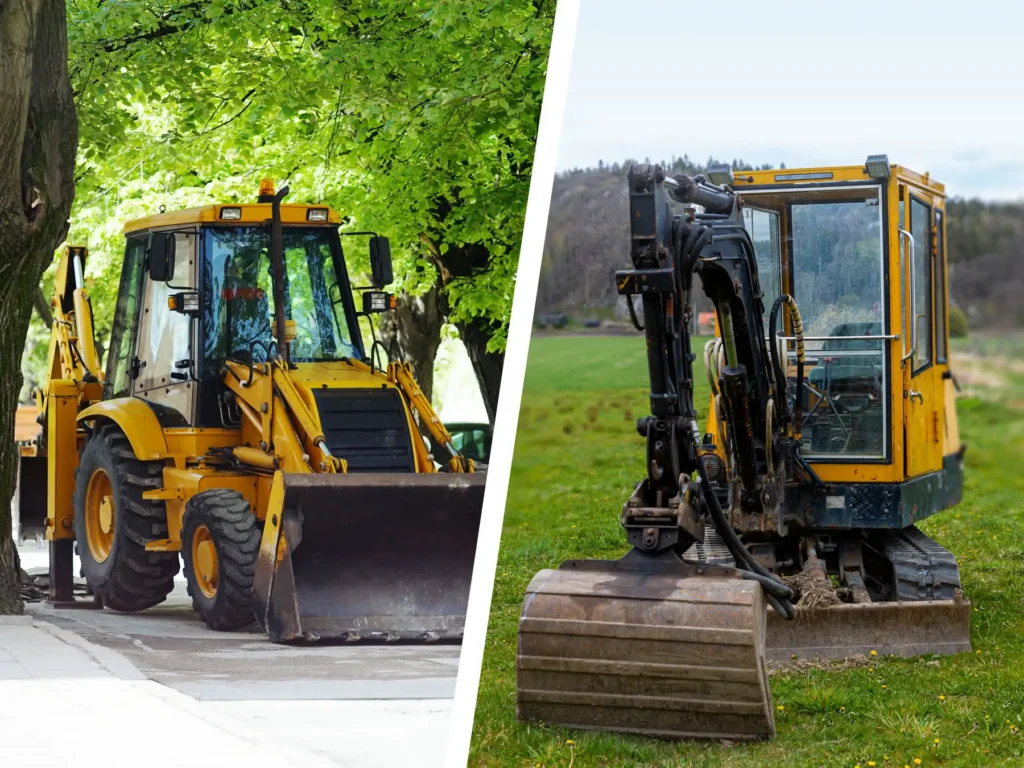
Table of Contents
ToggleWhat Is a Backhoe?
For most people, a backhoe is the heavy yellow construction machine you see on every construction site, road project, and housing development. It’s big. It’s versatile, with a loader on one end and a backhoe arm on the other. And, bottom line, it’s the machine you want when you need to scoop up a lot of dirt, or your plumbing system went wacky and you need to dig a trench to China to reach the problem.
Pros of Backhoes for Small Projects
Harnessing the capabilities of both a dozer and a front-end loader, the backhoe combines the advantages of both machines into one convenient package. The front bucket and front-end loader capabilities endow the backhoe with much of the same material-handling abilities provided by the dozer. The backhoe itself provides the same abilities featured in the front-end loader. Trenching, digging, and deep excavation chores are handled by the versatile backhoe arm.
- Versatility: A backhoe is preferable when you have a lot of multitasking work to do—digging an area, backfilling, and then moving materials around to get your foundation done.
- Cost effective in the long run: A backhoe is more money to invest in up front than a mini excavator, but it can be more cost efficient because you will not have to rent [another machine], and it will increase productivity.
- Efficiency: If you are doing any kind of production work—dig a hole, let’s say for a new house foundation, and then load [a truck] and go—how nice is it to have a machine that digs the hole and loads the hole?
Advantages of Backhoes for Small Projects
| Advantages | Details |
| Versatility | Performs a variety of tasks like digging, loading, and material handling. |
| Cost-Effective | Combines multiple machines into one, saving money over time. |
| Time Efficiency | With both a front loader and a backhoe arm, tasks can be completed faster. |
What Is a Mini Excavator?
In addition to traditional construction and landscaping projects, mini excavators are a popular choice for small demolition tasks, material handling, and utility trenching, installation, and repair. They’re also commonly used in landscaping applications, such as in the digging of small ponds or other water features, and the installation of septic systems. Optional attachments like augers, plate compactors, and compaction wheels significantly expand the number of job types a mini excavator can handle. The versatility and compact size of a mini excavator make it a valuable asset to many types of businesses, individuals, and contractors.
Pros of Mini Excavators for Small Projects
- Maneuverability: Mini excavators are designed for confined spaces. Their smaller size allows them to navigate narrow pathways and tight corners, which makes them ideal for landscaping, small-scale trenching, and precise digging.
- Precision: With a smaller and more accurate arm, mini excavators can be used for delicate jobs such as trenching for utilities or digging around existing structures without causing damage.
- Lower Operating Costs: Mini excavators consume less fuel and are generally easier to maintain, making them more cost-effective for smaller, long-term projects.
Advantages of Mini Excavators for Small Projects
| Advantages | Details |
| Maneuverability | Ideal for working in tight spaces and on compact sites. |
| Precision | Excellent for detailed, precise tasks like trenching and digging around structures. |
| Fuel Efficiency | More fuel-efficient for smaller, focused tasks compared to larger machines. |
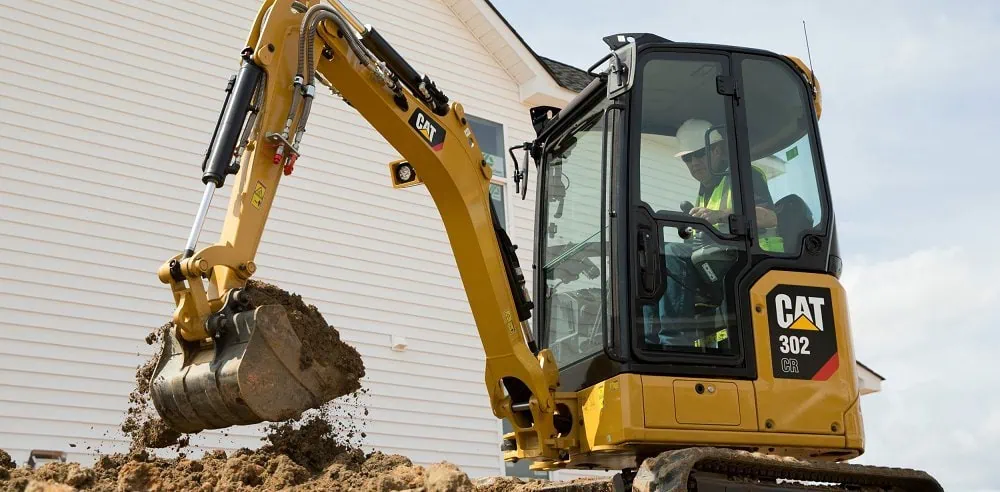
Key Differences Between Backhoe vs Mini Excavator
In order to make an informed decision, let’s compare backhoe vs mini excavator based on specific criteria:
| Feature | Backhoe | Mini Excavator |
| Size | Larger and more robust, requiring ample space. | Smaller, compact, and designed for tight spaces. |
| Maneuverability | Less maneuverable in narrow or constrained areas. | Highly maneuverable and able to work in confined spaces. |
| Performance | Suitable for heavy-duty tasks like digging large trenches and moving heavy materials. | More efficient for smaller, detailed excavation and trenching work. |
| Cost | Higher initial cost due to larger capabilities. | Lower upfront cost, suitable for smaller budgets. |
| Versatility | Can both dig and load materials, reducing the need for additional machines. | Primarily used for digging and trenching, less versatile. |
| Fuel Efficiency | Less fuel-efficient compared to mini excavators. | More fuel-efficient, which helps reduce operational costs. |
Detailed Comparison: Performance in Different Projects
The best way to determine which machine suits your project is to consider the types of tasks each will be handling. Here is a breakdown of how backhoes and mini excavators compare in real-world scenarios:
| Project Type | Backhoe | Mini Excavator |
| Land Clearing | Ideal for large-scale clearing, able to handle rough terrain and move large volumes of material. | Not suitable for large-scale clearing due to its small size and limited lifting capacity. |
| Landscaping | Suitable for large landscaping projects but can damage delicate features in tight areas. | Perfect for detailed, precision work like digging around trees or moving small rocks. |
| Trenching for Utilities | Effective for large trenches or deeper excavations. | Excellent for narrow trenches and digging around existing structures. |
| Small Foundation Digging | Can handle larger foundation excavations. | Best for small-scale foundation digs in confined spaces. |
When to Choose a Backhoe for Small Construction Projects
Best Use Cases for Backhoes
For even more massive digging and material handling, use a backhoe, which combines a front loader with a backhoe arm, allowing you to dig and move material almost as quickly as you walk.
- Land clearing and excavation: A backhoe’s ability to handle both digging and loading makes it perfect for clearing large plots of land.
- Trenching for utility lines: For larger trenching jobs, backhoes can provide the depth and reach required.
- Site preparation for new buildings: Backhoes are ideal for preparing sites for new construction projects, allowing for both excavation and material transportation.
When to Choose a Backhoe
| Project Type | Reason for Choosing a Backhoe |
| Land Clearing | A backhoe can handle both digging and material transport efficiently. |
| Excavation of Large Sites | The large capacity and versatility make it ideal for large-scale excavation tasks. |
| Trenching | Can dig deeper trenches quickly and load materials easily. |
When to Choose a Mini Excavator for Small Construction Projects
Best Use Cases for Mini Excavators
The small nature of a mini excavator allows for more delicate work compared to larger excavators. They can be used for tasks like fine-grading work, working around pipes, and other tasks where a small excavator is beneficial. Additionally, mini excavators can come equipped with a variety of attachments to make them even more versatile.
- Landscaping: Mini excavators are perfect when precision is needed, such as planting, digging for drainage systems, or removing stumps.
- Utility trenching: Often, mini excavators are the go-to machines for trenching in urban environments where space is limited.
- Digging around existing buildings: Because they are so compact and maneuverable, they’re an excellent choice for digging where you’re restricted by existing infrastructure.
When to Choose a Mini Excavator
| Project Type | Reason for Choosing a Mini Excavator |
| Landscaping Projects | Ideal for intricate, detailed work in confined spaces. |
| Trenching in Narrow Spaces | Mini excavators excel in narrow trenching where precision is important. |
| Digging Around Structures | Perfect for digging near buildings and infrastructure without causing damage. |
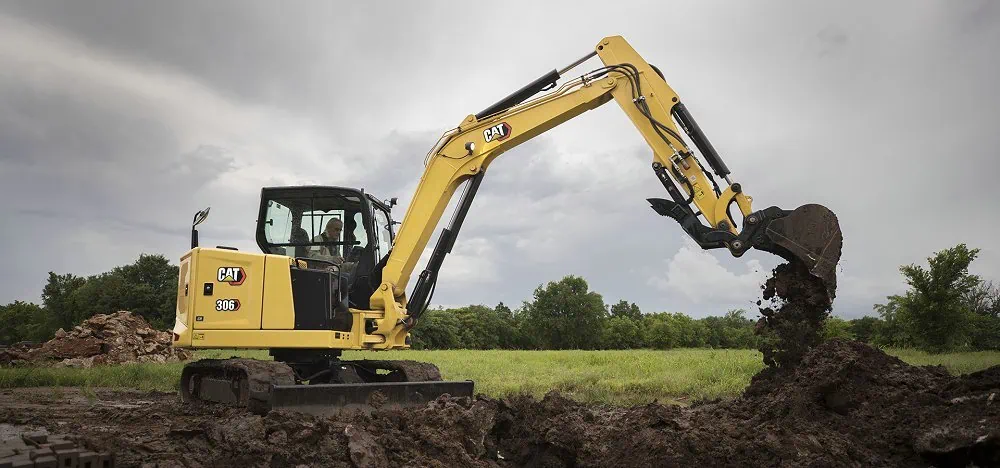
Backhoe vs Mini Excavator: Which One Is More Cost-Effective for Small Projects?
Initial Purchase Costs
However, when considering backhoe vs. mini excavator for purchase, the initial costs are drastically different. A backhoe is typically more expensive than a mini excavator due to its increased size and functionality, while mini excavators are designed to be a more affordable alternative for price-conscious buyers.
| Cost Comparison | Backhoe | Mini Excavator |
| Initial Purchase | Around $50,000 to $100,000. | $20,000 to $60,000. |
| Maintenance Costs | Higher, due to larger and more complex components. | Lower, simpler design with fewer repair needs. |
| Fuel Efficiency | Generally less fuel-efficient for smaller tasks. | More fuel-efficient for precise tasks. |
Long-Term Cost Considerations
In the long run, the mini excavator is usually cheaper to operate. They use less fuel, require fewer repairs, and you can rent or buy more specialized models for smaller-scale projects.
On the other hand, because a backhoe can do so many things, you may not need any other equipment, which could save you money in the long run.
Mini Excavator vs Backhoe: Which One is More Versatile for Different Construction Tasks?
Versatility of Mini Excavators
Mini excavators are all about versatility, especially for different construction tasks. One of the things mini excavators are great at is being able to do detailed work, which is important for tasks like trenching for utilities, digging for foundation footers, or doing detailed grading or landscaping.
The reason mini excavators are so versatile is because you can put a lot of different attachments on them. Attachments, such as an auger, a hydraulic hammer, or a brush cutter, allow you to do various specialized tasks. For example, if you need to drill a hole for a post, an excavator with an auger can quickly drill straight down. If you need something used to break up concrete or hard surfaces, a hammer can easily slam into the ground or a wall to help break things apart. If you need some aggressive clearing done, a brush cutter can easily remove brush and trees from an area, saving you time and the need for various machines.
For instance, in the landscaping world, a mini excavator with a brush cutter makes it easy to knock down brush, bushes, or trees. In the utility world, you could use an auger to drill a straight, narrow hole for a post or to drill precise holes for poles or foundations. Overall, that versatility allows contractors to be productive and make money with a machine that can do many different things.
Advantages of Mini Excavators for Specific Tasks
| Task | Mini Excavator Benefits |
| Trenching | Precise digging, ability to work around obstacles |
| Landscaping | Attachments for brush cutting and site preparation |
| Digging Around Foundations | Compact size for working in tight spaces |
| Utility Installation | Can handle narrow, deep trenching with precision |
Versatility of Backhoes
Backhoes are very versatile because they are a dual-purpose machine. They can dig like an excavator and handle materials like a loader. The combination of the loader function and the excavator function means that a backhoe can handle materials like stone, dirt, and pipe, and load and unload it just about anywhere on the job site. That versatility is especially handy on a big construction site, where lots of different things are going on to build a project.
For example, a backhoe can dig a trench, then use the loader to move the dirt somewhere or fill it directly onto a dump truck. It saves time and ultimately allows you to be more productive because you don’t have to go out and get other machines to handle things that the backhoe can do itself. The backhoe also does well doing anything that requires material handling, such as lifting things in the air, setting things in place, or even digging footers and setting pipe. Because it can operate as an excavator and a loader, a backhoe can essentially do the job of a big suite of machines with just one.
Advantages of Backhoes for Specific Tasks
| Task | Backhoe Benefits |
| Digging and Excavating | Powerful digging for large projects |
| Material Handling | Load, transport, and place materials with ease |
| Moving Dirt and Debris | Dual function for quick excavation and material transport |
| Lifting Heavy Objects | Ideal for lifting and setting materials on site |
The choice of backhoe vs. mini excavator becomes pretty clear when it comes to working in confined spaces, especially in construction. Mini excavators were specifically built to get into tight spaces. They’re built to fit, maneuver, and work in a very tight space, while a backhoe is designed to do a broad range of things. It can still dig a hole, but it’s a pretty big machine when you’re trying to squeeze through a tight access point or work in a restrictive area.

Backhoe vs Mini Excavator for Urban Construction
Urban construction tends to require machines that can work in tight spaces efficiently. When it comes to urban construction, mini excavators usually do a better job. They can get into very tight spaces to do things like trench for utilities and do delicate work such as digging without disturbing the surrounding area.
In fact, mini excavators do great work in urban environments because they can get where the big equipment can’t. For example, in densely populated neighborhoods or on big city streets where you’re working on infrastructure utilities, you can use a mini excavator to dig, trench, or do site prep without having to have multiple big pieces of equipment, or without disturbing the neighbors or surrounding properties very much.
A backhoe still has a place in urban construction, but because it’s larger, it has a hard time getting down narrow streets and through tight alleyways. It’s much better suited for construction sites where you have open areas and room to move around without space constraints, compared to typical city construction projects.
Urban Construction Equipment Comparison
| Criteria | Mini Excavator | Backhoe |
| Access to Narrow Streets | Compact and nimble, fits through small spaces | Larger, more difficult to maneuver through narrow streets |
| Versatility in Urban Tasks | Perfect for urban digging, trenching, and landscaping | Ideal for material handling and large-scale excavation |
| Impact on Surroundings | Minimal disturbance due to smaller size | Larger footprint, more disruption to surroundings |
In conclusion, both mini excavators and backhoes have their own place, depending on what kind of construction you’re doing and the way the site’s laid out. When you’re working in a tight space or need to be more precise, usually the mini excavator is the tool you want. When you’ve got a big area and you need to dig but also need to handle materials, the backhoe is going to be your best friend. Make sure to determine your needs and think about how much space you’ve got to move around. Once you know those things, you can put the right piece of equipment on the job!
Conclusion
Ultimately, your choice of a backhoe vs mini excavator boils down to what kind of project you’re working on. If you need versatility and you’re going to dig and handle material, the backhoe is going to be the best. The mini excavator is going to perform best in small, tight spots where you need to be careful or detailed.
Therefore, look at my site, think about your project, and figure out what makes the most financial sense long-term for the size project you’re working on.
Follow us on :YouTube.

